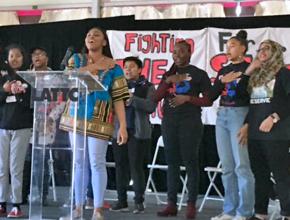How we can take anti-racism into LA schools
, a member of United Teachers Los Angeles, reports on a student-led forum that brought the Black Lives Matter message to organizing around a local issue.
NEARLY 700 people attended the "Making Black Lives Matter in Schools" event held at Trade Tech College in central Los Angeles on February 24.
The forum was spearheaded by Students Deserve and Students Not Suspects, community organizations led by high school students in the Los Angeles Unified School District (LAUSD)--and was co-sponsored by Black Lives Matter-LA, the Youth Justice Coalition, United Teachers Los Angeles (UTLA), the ACLU, Public Counsel and Reclaim Our Schools-LA. Patrisse Khan-Cullors, co-founder of Black Lives Matter and author of the new memoir When They Call You a Terrorist, spoke alongside student panelists.
For the past year and a half, students have been pushing the LAUSD to end its policy of "random searches" that pull students out of class without cause to search them with a metal detector wand. At many schools, the wands aren't used--instead, students are told to empty their backpacks.
The "random" searches became mandatory in LAUSD in 2011. Deans and security personnel are supposed to pick one classroom each day to visit and pull out several students who are supposed to be selected at random.

The searches are implemented unevenly across the district, and schools with the largest Black populations conduct the most searches. A study by UCLA's Civil Rights Project found that in all the recorded searches conducted between 2013 and 2017, no guns were recovered, while school supplies and markers were confiscated 1,566 times and self-care and hygiene products 282 times.
The conversation around random searches has become more heated after the Parkland, Florida, school shooting. Some have called for an increase in school police presence and greater surveillance and searching of students.
However, these measures have not been shown to make schools safer. Thirty thousand additional school police were added after the 1999 shooting at Columbine High School, but this didn't reduce the number of school shootings.
In fact, the criminalizing and alienating impact of searches can have the opposite effect, by reducing the bonds of trust that students have with adults, making them less likely to seek help or report signs of danger, according to the National Association of School Psychologists.
AT THE FEBRUARY 24 event, the inspiring introductory panel included seven high school student leaders, notably all female and non-binary individuals.
Hamilton High School student Grace Hamilton said, "Only 4 percent of high schools in the country have random searches. That means that 96 percent of schools feel they can find other ways to keep their students safe. When they treat us like criminals, we don't go to them when we have problems."
Dorsey High School student Christabel Ukomadu explained, "Random searches are part of a continuum of violence that Black people face. There's a problem with the way Black people are treated in our society. Ending random searches will be a big step in making us feel like our lives matter."
Wendy Garcia-Torres from UCLA Community schools added, "This policy places undocumented youth at risk for coming into contact with [Immigration and Customs Enforcement]. Supporting a Black-led movement will also benefit Latinx students. In the words of Alicia Garza, 'When Black people get free, we all get free.'"
Last year, organizing and a rally at the School Board organized by Students Deserve forced the Board to hold a daylong "study session" on the policy. However, school police were given more time to testify than student and community organizations, and LAUSD didn't commit to making any changes to the policy.
The February 24 event put forward an alternative to random searches: fund community schools with more psychiatric social workers, counselors, college counselors, full-time nurses, art classes and ethnic studies. These measures would increase the ability to identify troubled students and reduce the level of student alienation from school.
UTLA has incorporated the demand to end random searches and fund 20 community schools into its bargaining package, as part of its current contract fight with LAUSD.
THE EVENT drew criticism from the LA school police union, which called it an "anti-police rally" and demanded that UTLA withdraw its support. To their credit, UTLA leaders did not bow to this pressure, but stood their ground in support of students and racial justice.
However, a conservative opposition within UTLA latched on to the school police attack, with some union members organizing a counteraction the day before the February 24 student-led event.
While the turnout from teachers at that action was small, the rally still had a racist, divisive and damaging impact. The rally closed with the theme song from the racist TV show Cops, a show that constantly featured degrading and brutal treatment of Black people.
Nevertheless, with breakout groups led by students from dozens of different schools, Making Black Lives Matter in Schools became a launching pad for a new round of the campaign to end random searches.
Students Deserve distributed 15,000 "End Random Searches" buttons that student activists will be passing out across the city to educate more young people about the issue and build pressure on LAUSD.
In an era of debate about what will make our schools safe, teachers' unions like UTLA must continue to stand with students of color against measures that criminalize youth and contribute to the school-to-prison pipeline.
This means having some brave conversations where we win more educators to social justice unionism--and to an understanding that teachers cannot win our own struggles if we don't take up the struggles of the communities where we work.


